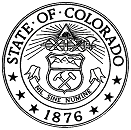![]() The information on this page is archived and provided for reference purposes only. It may be outdated or no longer maintained.
The information on this page is archived and provided for reference purposes only. It may be outdated or no longer maintained.
Secretary of State Jena Griswold Joins Governor Polis for Signing of Bipartisan Election Laws
Denver, June 28, 2021 - Secretary of State Jena Griswold today joined Governor Jared Polis for the signing of two election bills that had bipartisan legislative support, and will improve Colorado’s elections. Signed into law today were the “Multilingual Ballot Access for Voters” bill, which creates more access to Colorado’s ballots to eligible voters for whom English is not their primary language, and the “Ranked Choice Voting in Nonpartisan Elections” bill, which creates a framework outlined by the Secretary of State’s Office for Colorado municipalities to opt into utilizing Ranked Choice Voting in their elections.
“Part of what makes Colorado’s elections the country’s gold standard is our dedication to continual improvement,” said Secretary Griswold. “While other states are rolling back voting access, Colorado reaches across party lines to further strengthen our election system. Thank you to the Governor and the sponsors of these bills for establishing resources that enable eligible voters for whom English is not their primary language to understand their ballot and for facilitating Ranked Choice Voting in Colorado’s communities. Today even more Coloradans can have their voices heard.”
The “Multilingual Ballot Access for Voters” bill creates a multi-lingual hotline for voters at the Secretary of State’s Office for the 2022 general election and beyond in minority languages that 2,000 or more Coloradans speak primarily at home and for which those people don’t speak English very well, as defined the census bureau. Currently, there are five languages other than English that meet this threshold; Spanish, Vietnamese, Mandarin, Cantonese and Korean. If updated census bureau data shows there are more languages that qualify, they will also be added. The bill also requires county clerks to provide a minority language sample ballot and requires counties that meet certain criteria to provide in-person ballots at a voter service and polling center in a minority language upon request. This bill helps ensure that every Coloradan who is eligible can confidently vote their ballot. The bill was sponsored by Representative Yadira Caraveo, Senator Julie Gonzales, and Senator Dominick Moreno.
Meanwhile, “Ranked Choice Voting in Nonpartisan Elections” bill allows municipalities that wish to use Ranked Choice Voting the ability to do so in non-partisan, municipal election contests. Ranked Choice Voting allows voters to rank their candidate preferences in order, ensuring that the winning candidate does so with a majority support of voters, not simply a plurality. The bill requires that the Secretary of State establish rules and systems by which municipalities can conduct Ranked Choice Voting in nonpartisan elections. The bill was sponsored by Representative Chris Kennedy, Senator Stephen Fenberg, and Senator Faith Winter.
Last week the Governor signed the “Colorado Votes Act,” which also had bipartisan legislative support, that will make key improvements to Colorado’s election process including enhancing online voter registration by allowing voters to register with their social security number, requiring Risk-Limiting Audits for recall elections, and establishing rules clarifying that election judges may not wear slogans that support or oppose a particular candidate or ballot measure while at a voting center, among many other technical changes.




 Menu
Menu  Search
Search 
